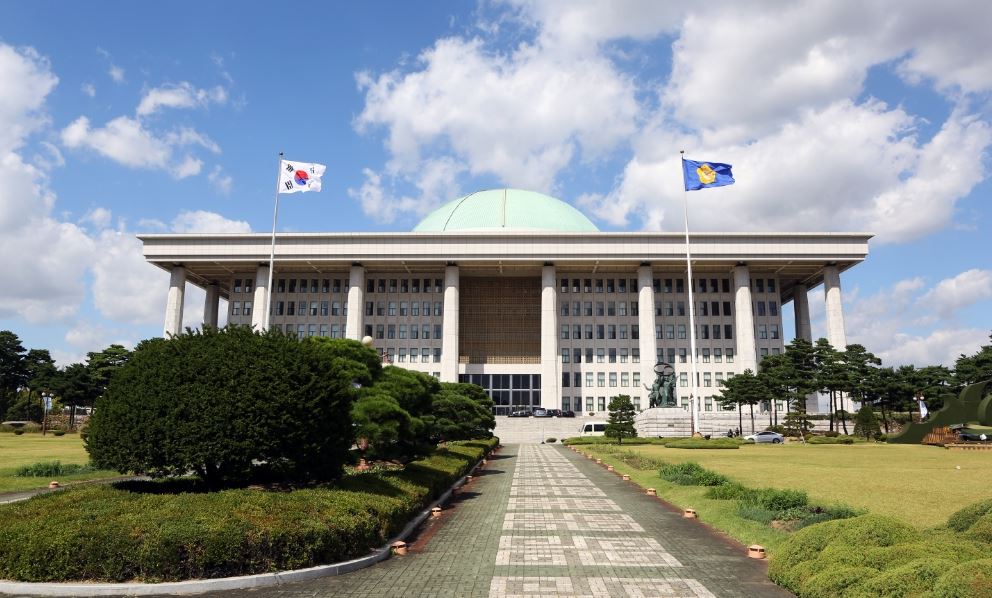
Emmanuel Macron, President of the French Republic, Sebastian Kurz, Prime Minister of Austria, and Jacinda Kate Laurell Ardern, Prime Minister of New Zealand. What do they all have in common? Yes, they are all leaders of their respective nations, but more importantly, they are all young politicians. Their campaign platform was centered on youth and focused on the younger generation. This new election style of campaigning is a global trend and it has resulted in a number of young politicians becoming political party leaders or heads of state. Then, has there been any chance in the Korean political community? Are young people in Korea free to voice their opinions in politics?
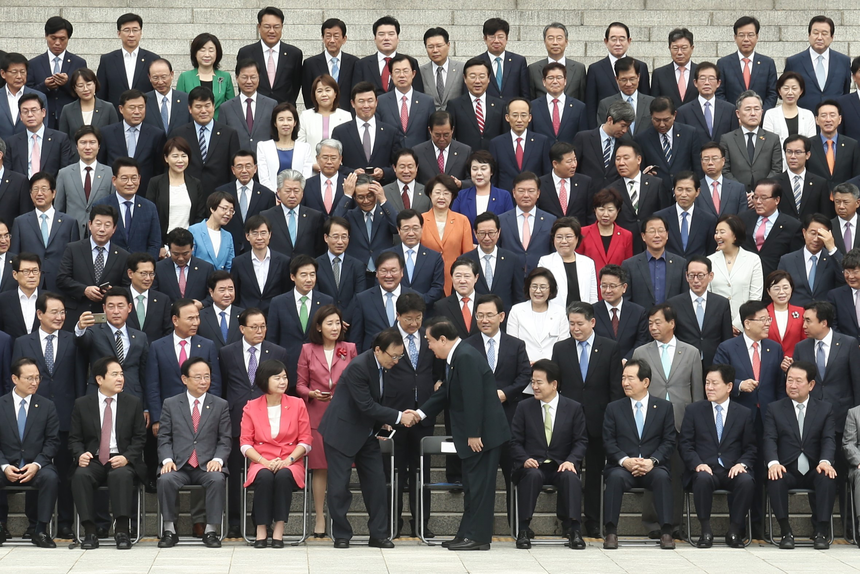
Yes, We Are Young
Being young implies a time of growth and maturity both physically and mentally. According to dictionary definitions, it is difficult to exactly define the age of youth. In Korea, youth are considered to be in their twenties, but each administration and political party has its own criteria for defining the age of a youth. In general, young people from the age of 19 to 39 are considered young adults, and in some cases, people aged 15 to 34 are to be young adults. In some political circles people aged 45 or younger are considered young adults. Regardless of actual age, younger people today are taking over politics in many countries. The average age of 28 EU nation leaders has fallen from 55 to 50 in just a decade. In Korea, however, most politicians are over 65 years old and have been elected for positions in their parties or for prominent posts several times. The average age of lawmakers in the 20th Assembly is 56.5. There is no one younger than 30, and only 2 people are in their thirties.
To balance the generation distribution, each political party in Korea has started a youth political education program in order to promote political careers among younger people. During the June Local Elections earlier this year, 46 young adults aged 20~30 were elected to metropolitan councils and 192 people were elected to the primary local government. These figures represent the increased number of elected people compared to four years ago when the number of young adults elected were 26 and 85 respectively. At the party convention, two people in their 30s were elected to the Bareunmirae Party supreme council, and two people in their 40s were elected to the Democratic Party supreme council.1) Besides these change, young adults are assuming more influential positions in governments. Despite of the changes, young politicians face challenges trying to reach their goals. Not only is the number of young politicians small, but they face great difficulties.
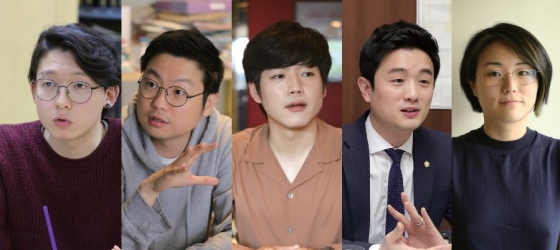
PHOTO FROM THE LEADER, MONEY TODAY
The picture of young politicians
No One Remains Young Forever
It has become trendy for young politicians to head political parties and even heads of state, but Korea is still an unwelcoming environment for young politicians. First, older politicians usually take positions like specialists in politics. That is, there are few good positions for young politicians in politics, and these jobs are typically low paying positions. Young politicians are treated like interns during parliamentary sessions or political party meetings. While an internship builds the foundation for a career, it does not lead directly to that dream. In other words, rarely are young politicians given the chance to show their talent. Jang Kyungtae, Senior Vice President of Democratic Party Youth Commission, said, “Foreign countries allow young politicians to gain experience in by taking responsibility for major positions in policy research institutes and others, but in Korea, they are given little opportunity to develop and even less chance to perform major tasks, so younger people who dream of being politicians quickly become disappointed.”2) Consequently, even though young people have various careers, they are limited as to what they can do in political circles.
Young politicians face challenges obtaining donations needed for their election campaigns. In Korea, a trust money system means that each candidate must deposit a certain sum to the National Election Commission, and that amount must be at least 2 million won. If one dreams of a high ranking position, that person must deposit a larger sum of money. If a candidate does not achieve a certain number of votes in an election, they forfeit the deposited amount. In addition to the needed trust money, running for election requires a lot of money and some of the money must come from one’s own pocket. Lee Sungyoon, Former Co-Representative of Our Future Party, said “The average cost of campaigning in an election to be a district representative is between 30-40 million won.”3) These financial expenses are barriers to young people who dream of becoming a politician and new discussions on the deposit system are needed.
Last, young politicians are discriminated against because of their age. Politicians are recognized as professions only because of their influential power. Korean society also has expectations and perceptions that older candidates have more expertise and ability because of their age. When asked if he had experienced any prejudice due to his age, Yeo Sunwoong, Former Gangnam-gu Councilor, said, “Yes. Some people think politics should be controlled by older people. Younger people campaigning in elections are at a disadvantage compared to people who have years in the field, for people think they have gained much professional knowledge after so many years.”4) However, these abilities do not necessarily correlate to one’s age, and correlations among age, knowledge and insight are also not predetermined. In other words, being young does not mean a lack of ability. Nevertheless, in reality, Koreans are biased towards young politicians, which is another problem young people face when they enter the world of politics.
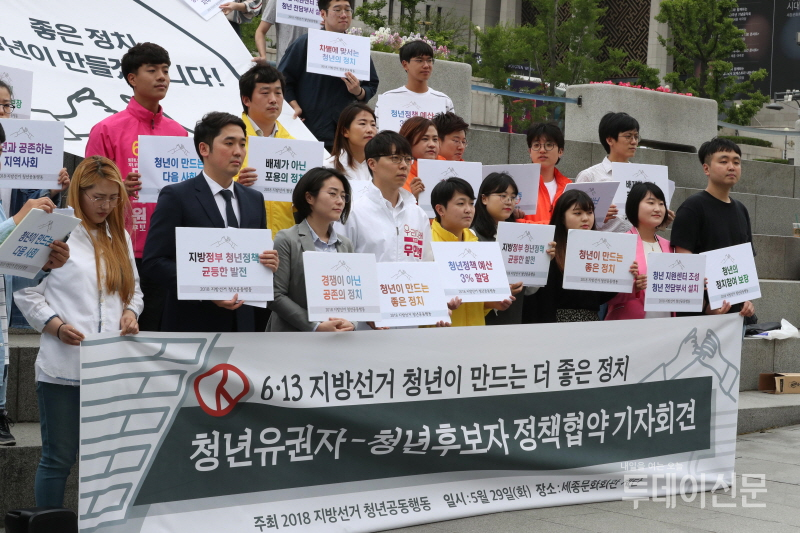
PHOTO FROM TODAYNEWS
6.13 Local Election, Better Politics Made By Youth
Youth Voters-Youth Candidates Policy Convention Press Interview
Government without the Young Generation
Platforms for young politicians to voice their convictions are few. Governmental institutions, including political parties, need to support and encourage young people getting involved in politics. More young people are needed in the field because they act as spokespersons for the young generation. The National Assembly represents the people's will and as representatives of the people, they gather to make nationwide decisions. The fact that there are no younger generation representatives in the National Assembly places them at a disadvantage and as such, their voice is ignored by the state. There is a need for someone to bring the voices of young people into the National Assembly, and that role can be achieved by young politicians. In other words, it is necessary to increase the number of lawmakers interested in policies that affect the younger generation, and the best people for this job are young people who know the challenges and grievances today’s youth have and face.5)
Next, young politicians can approach more flexibly into new agendas. The rapid sophistication and differentiation of Korean society has led to new agendas in various fields, such as gender equality, environment protection, laborer conflicts between regular and irregular workers, and so on. One representative example is feminism. An Minho, Professor of School of Communication & Media at Sookmyung Women’s University, said, “MeToo movement and feminism are not simply movements for spreading the rights of women, but they are raising consciousness of problems in society with the old conservative culture that restricted power in our society."6) New trends, led by young women in their twenties in Korea, have moved Korean society towards addressing its gender role discrimination, but society has not been fully accepting of the trends. Korean society needs new paradigm that promotes these new trends and broadens peoples’ minds to be more flexible and forward thinking. The strength of young politicians is that they understand the fast-changing trends of the times. Furthermore, they can suggest possible resolutions and alternatives. In short, young politicians present a new paradigm that better suits the needs of the rapidly changing world.
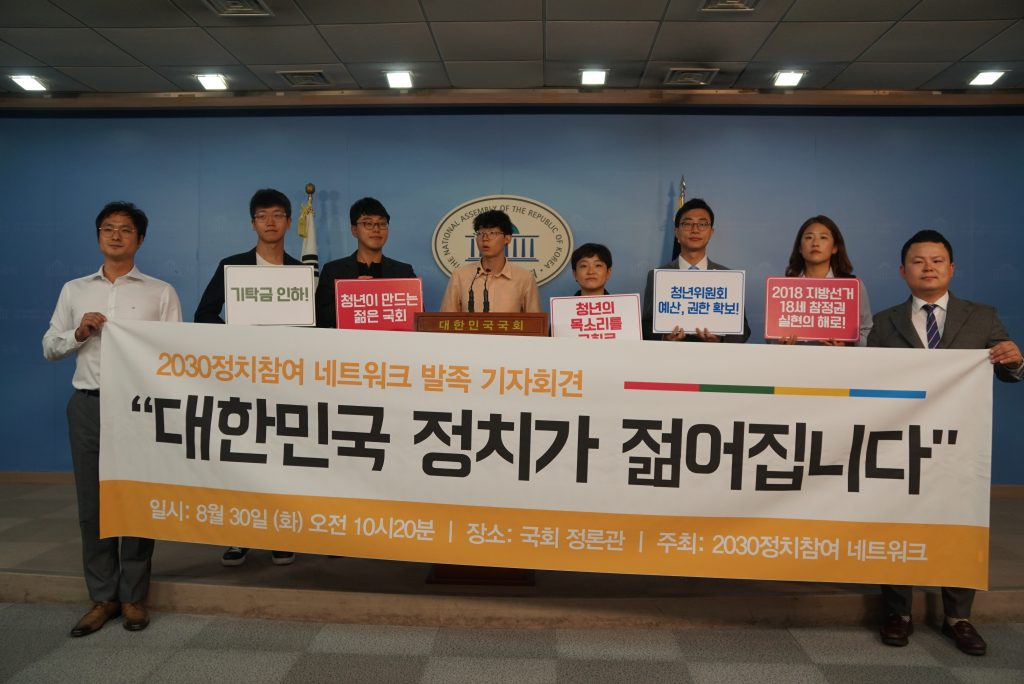
PHOTO FROM OUR FUTURE PARTY OFFICIAL BLOG
Korean Politics Can Be Changed
For All of Us
John Quincy Adams said, “If your actions inspire others to dream more, learn more, do more and become more, you are a leader.” Each person defines a leader differently, but what is clear is that a leader influences others. Young politicians need to take a stronger stand when playing their role as they are just as qualified as their elder colleagues. They open doors and show others their qualifications and abilities. Today’s Korean politic circles are full of old boys, but there is a rising thirst for young leadership. A balance is necessary. Korea needs more young politicians who speak for the younger generation, and these young politicians need a fair working environment in order to accomplish this. What kind of leader do you want? What kind of leader does Korea need?
1) Hong Sanghyun, “Young Politicians, Can They Bud at This Time?”, Today Newspaper, September 3, 2018
2) Lee Dohyung, “Political Schools Made by Political Parties… Are They the Gateway to Being a Young Politician?”, Segye Ilbo, September 17, 2018
3) Hong Semi, “Young Politicians Is the International Trend, the Old Boy Trend Is not Normal”, the Leader, September 4, 2018
4) Same as 3
5) Recommend to refer FEATURE of NO. 346 Magazine
6) Same as 3


